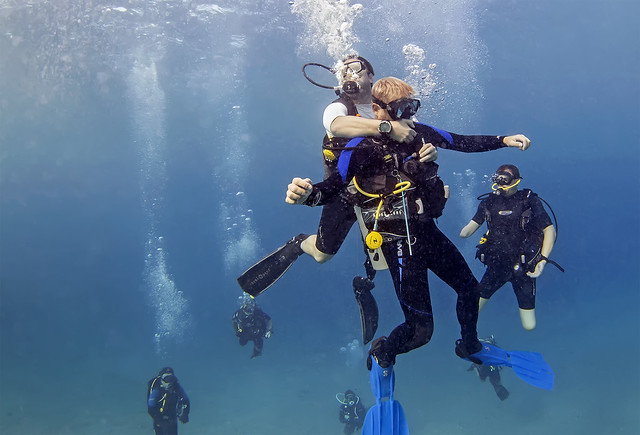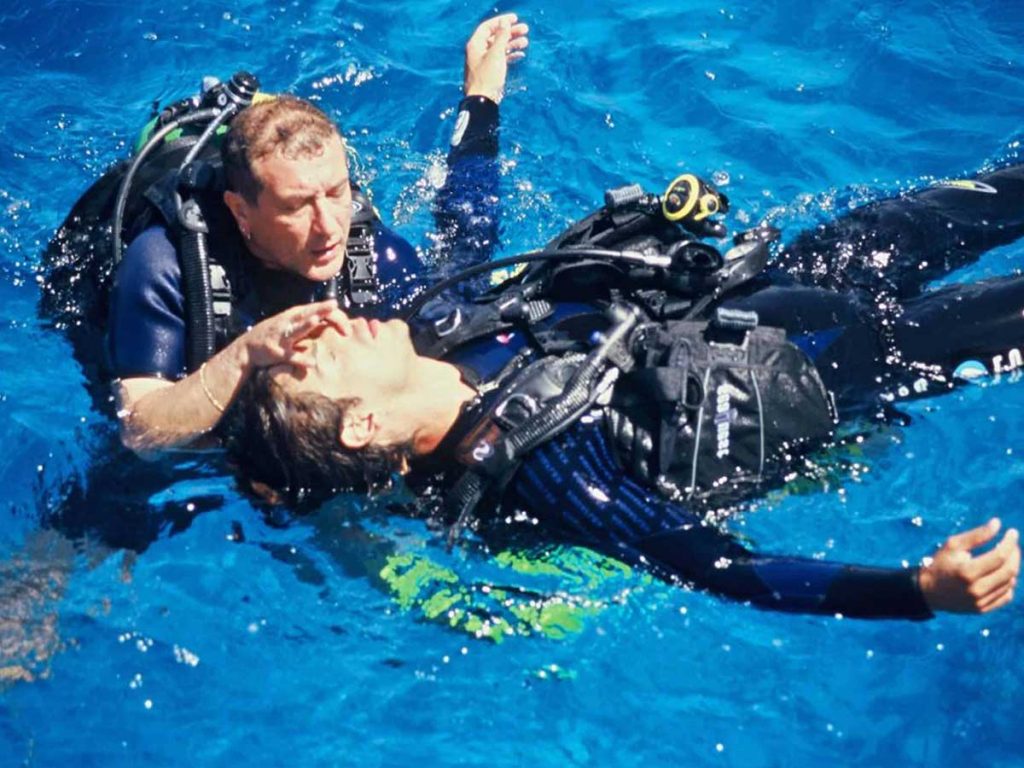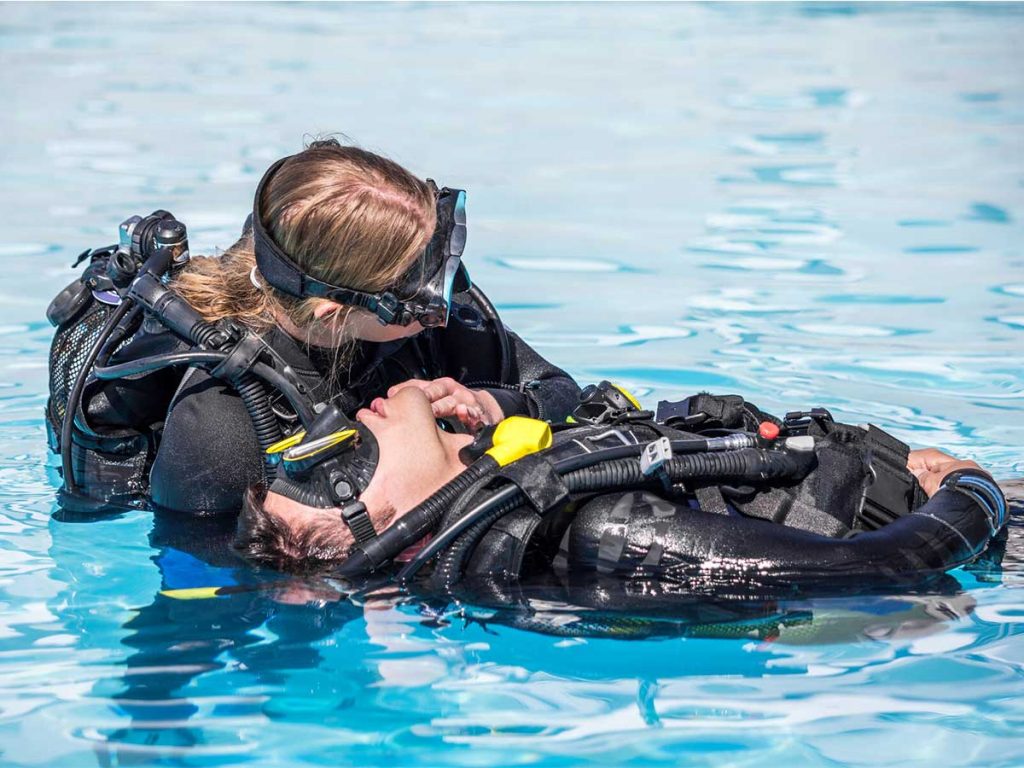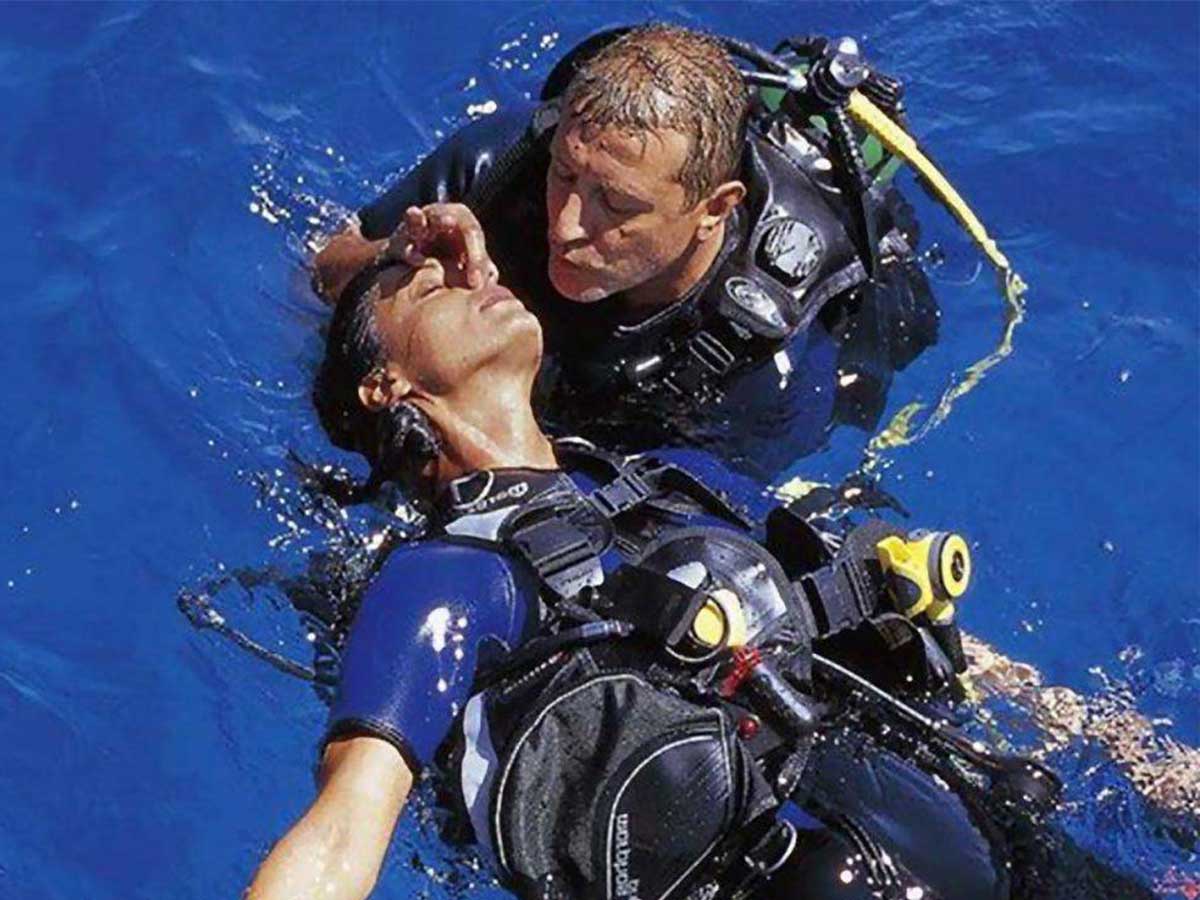Dive into Adventure: A Comprehensive Guide to Rescue Diving
Choosing between the Rescue Diving PADI Diver Course and SSI or CMAS dive courses in Hurghada? Learn about course structure, Certification Recognition, Flexibility, and Specialization options to make an informed decision.
Diving into the mystic depths of the ocean is an experience that Transcends words. It’s a journey of exploration, discovery, and connection with the Unparalleled wonders of the marine world. One of the most rewarding and Empowering aspects of this journey is the Attainment of a Rescue Diving certification.
This Comprehensive guide aims to walk you through the Intricate world of Rescue Diving, its diverse Certifications, and the unique Opportunities it offers. So, buckle up and let’s dive in!
What is Rescue Diving?
Rescue Diving is the practice of scuba diving with a specific focus on rescue situations. It’s a critical step forward on your diving journey, Enabling you to handle emergency situations, assist fellow divers, and enhance your own safety Underwater.
The Significance of Rescue Diving
Rescue Diving is more than just another certification. It empowers divers with the ability to prevent and manage problems in the water, handle accident management, and even fix common equipment problems. It’s about becoming a more confident diver and a more responsible dive buddy.
Rescue Diver Courses: PADI, CMAS, and SSI
Three primary organizations offer Rescue Diver courses: the Professional Association of Diving Instructors (PADI), the Confédération Mondiale des Activités Subaquatiques (CMAS), and Scuba Schools International (SSI). Each offers unique benefits and caters to different diving preferences and goals.
PADI Rescue Diver Course

PADI is the world’s largest scuba diving training organization, offering a range of PADI diving courses, including the Rescue Diver course. This course is recognized globally and provides comprehensive training in recognizing and responding to dive emergencies.
CMAS Rescue Diving Course

CMAS offers a robust training program emphasizing safety and proficiency. Its CMAS Rescue Diving course is designed to train divers on managing emergencies and providing first aid, making it an excellent choice for those looking to strengthen their safety skills.
SSI Rescue Diver Course

SSI is known for its focus on creating confident and competent divers. The SSI Rescue Diver course equips divers with the skills to respond to diving emergencies and provide necessary assistance, fostering a sense of responsibility and confidence.
Deciding Between PADI, CMAS, and SSI
The decision between PADI, CMAS, and SSI largely depends on personal preference and specific training goals. All three organizations offer high-quality training, but they differ in teaching methods, course structure, and certification levels.
Rescue Diver Prerequisites
To enroll in a Rescue Diver course, you need to meet certain prerequisites:
- You must be a certified Open Water Diver (or equivalent).
- You must have completed Emergency First Response Primary & Secondary Care training (or equivalent).
- You must be medically fit for diving.
The Journey to Becoming a Rescue Diver
The journey to becoming a Rescue Diver involves a mix of knowledge development, rescue training exercises, and open water rescue scenarios. The course focuses on:
- Emergency oxygen use
- Minor scuba gear troubleshooting
- Development of underwater safety techniques
- Improvement of navigation skills
- Identification of a diver in need at the surface or underwater
- Rescue techniques for another diver or yourself
Benefits of Being a Rescue Diver
Being a Rescue Diver opens up a world of opportunities and benefits. It’s a stepping stone towards a professional scuba career, preparing you for the PADI Divemaster or PADI Instructor rating. It’s also a prerequisite for certifying as a Public Safety Diver.
Rescue Diver Courses in Hurghada
Hurghada, Egypt, is an excellent destination for diving enthusiasts looking to attain their Rescue Diver certification. The Red Sea’s rich biodiversity and clear waters provide a perfect training ground for aspiring Rescue Divers.
Final Thoughts: Is Rescue Diving Worth It?
In a nutshell, yes! Rescue Diving is a rewarding and empowering experience. It not only enhances your diving skills but also equips you with the ability to handle emergencies, making the underwater world a safer place for you and your fellow divers. It’s an investment in your safety, confidence, and competence as a diver. So, are you ready to dive into this exciting adventure?
Embark on this enriching journey with us and feel the thrill of exploration, discovery, and connection with the incredible marine world. Our experienced, passionate, and professional team is ready to guide you through the captivating world of Rescue Diving. Let’s dive in!
Rescue Diving PADI Diver Course vs SSI or CMAS Dive Courses in Hurghada: Which One Is Right for You?
Are you considering taking a dive course in Hurghada, Egypt, but unsure which one to choose? With so many options available, it can be challenging to determine which course is the best fit for your diving goals. In this article, we will compare the Rescue Diving PADI Diver Course with SSI and CMAS dive courses in Hurghada, focusing on course structure, certification recognition, flexibility, and specialization options. By the end, you will have a clearer understanding of which course is right for you.
Course Structure and Emphasis
The Rescue Diving PADI Diver Course stands out by placing a strong emphasis on critical rescue techniques and real-life scenarios, equipping divers with the necessary skills to handle emergency situations effectively. This course is designed to prepare divers to act as first responders in diving emergencies, making it a popular choice for those looking to enhance their safety and rescue capabilities underwater.
In comparison, SSI and CMAS dive courses in Hurghada also cover rescue techniques but may dedicate less time to this aspect. Instead, these courses often focus on broader diving skills and knowledge, providing divers with a more well-rounded education. While both approaches have their merits, if your primary goal is to become proficient in rescue techniques, the Rescue Diving PADI Diver Course may be the better choice for you.
Certification Recognition
When it comes to certification recognition, PADI certifications tend to have wider acceptance and greater international recognition. PADI is a globally recognized and respected dive organization, and their certifications are often preferred by dive centers and employers worldwide. If you plan to dive in various locations around the world or pursue a career in diving,
having a PADI certification can open doors to more opportunities.
However, it’s essential to note that SSI and CMAS dive courses in Hurghada are also recognized globally. While they may not have the same level of international recognition as PADI,
they are reputable organizations that offer high-quality dive training. If you primarily plan to dive in a specific region where SSI or CMAS certifications are widely accepted,
these courses may be the right choice for you.
Flexibility and Personalized Learning
When it comes to flexibility and personalized learning options, SSI dive courses in Hurghada have a distinct advantage. SSI offers an e-learning option,
allowing learners to study at their own pace and complete the theoretical portion of the course online before arriving at the dive center. This flexibility is ideal for those who prefer a self-directed learning experience or have limited time available for in-person classes.
On the other hand, PADI and CMAS dive courses in Hurghada typically follow a more structured classroom and practical training schedule.
If you thrive in a traditional classroom setting and prefer a structured approach to learning,
these courses may be better suited to your learning style. It’s important to consider your preferences and availability when choosing a course that offers the flexibility you desire.
Specialization Opportunities
If you’re looking to explore specific interests and passions within the diving world, CMAS dive courses in Hurghada offer a unique advantage. CMAS provides an extensive range of specialist certifications in areas such as underwater photography, marine biology, and archaeology. These specialized certifications allow divers to delve deeper into their chosen field and gain additional expertise, making them a great option for those seeking to expand their knowledge and skills beyond the basics.
While PADI and SSI also offer some specialization courses, CMAS stands out for its comprehensive range of options. If you have a particular interest or career goal in mind,
CMAS dive courses in Hurghada can provide you with the opportunity to pursue your passion while furthering your diving education.
Conclusion
When choosing between the Rescue Diving PADI Diver Course and SSI or CMAS dive courses in Hurghada,
it’s important to consider your diving goals, learning preferences, and career aspirations. The Rescue PADI Diver Course excels in its focus on critical rescue techniques and real-life scenarios,
while SSI and CMAS courses offer more well-rounded dive training.
PADI certifications provide increased international recognition, but SSI and CMAS certifications are also globally recognized.
Remember to weigh the benefits of flexibility and personalized learning options offered by SSI with the specialization opportunities available through CMAS. Ultimately, the right course for you will depend on your individual preferences and goals. Whichever course you choose, diving in Hurghada is sure to be an unforgettable experience, surrounded by the beauty of the Red Sea.
FAQs Rescue Diving: Your Ultimate Guide to Underwater Safety
Are you a thrill-seeker who loves exploring the mysteries of the deep blue sea? Or do you simply want to learn more about rescue diving and how you can contribute to underwater safety? Look no further, as this article provides answers to frequently asked questions (FAQs) about rescue diving. So, let’s dive right in!
Rescue diving is a specialized form of scuba diving that focuses on emergency response and saving lives underwater. As a rescue diver, you develop the skills needed to assist and rescue fellow divers in distress, manage diving accidents, and prevent potential dangers. This crucial role requires advanced training and certification to ensure the safety of both the rescuer and the person in need.
To become a certified Rescue Diver, you must first hold a basic scuba diving certification. This is usually the Open Water Diver certification. Once you meet this prerequisite, you can enroll in a Rescue Diver course with a reputable dive organization, such as PADI (Professional Association of Diving Instructors).
During the course, you will learn skills and techniques to identify, prevent, and respond to diving emergencies. The training includes rescue scenarios, CPR and first aid skills, search and recovery techniques, and underwater navigation. After successfully completing the course, you will be awarded the Rescue Diver certification, showing your competence in underwater rescue techniques.
What are the prerequisites for enrolling in a Rescue Diver course?
Before enrolling in a Rescue Diver course, you must:
- Be at least 12 years old, although some dive organizations may require a minimum age of 15 or 18.
- Hold a basic scuba diving certification, such as Open Water Diver or equivalent.
- Have completed a CPR and First Aid course within the past two years.
Always check with your chosen dive organization for any additional prerequisites specific to their program.
What skills will I learn during the Rescue Diver course?
The Rescue Diver course equips you with an extensive range of skills and knowledge, including:
- Recognizing and managing stress in yourself and other divers.
- Performing emergency response techniques, such as removing an unconscious diver from the water.
- Conducting searches for missing divers and efficiently responding to diving accidents.
- Administering primary and secondary care to injured divers.
- Applying oxygen therapy to divers experiencing decompression sickness.
- Utilizing rescue equipment and specialized communications underwater.
By mastering these skills, you will become a competent, confident, and reliable rescue diver, capable of handling a wide array of emergencies.
Are there any age restrictions to become a Rescue Diver?
While the minimum age requirement for the Rescue Diver course is typically 12 years old, each dive organization may have different age restrictions. Some organizations may require divers to be at least 15 or 18 years old to enroll in the course. It’s essential to check with your chosen dive organization to confirm their age requirements.
What are the responsibilities of a Rescue Diver?
As a Rescue Diver, your primary responsibility is the safety and well-being of yourself, your dive buddy, and other divers. Your roles may include:
- Being aware of potential risks and hazards during dives.
- Keeping a watchful eye on other divers’ behaviors and conditions.
- Assisting distressed or injured divers underwater and bringing them to safety.
- Providing first aid and CPR if necessary.
- Communicating effectively with dive buddies and coordinating rescue efforts.
- Participating in ongoing training to maintain and improve your rescue skills.
Can I perform rescue diving without formal certification?
While it’s possible to assist in a diving emergency without formal certification, it is strongly recommended to undergo professional training and obtain a Rescue Diver certification. Proper training ensures you have the necessary knowledge and skills to handle emergencies effectively, minimizing risks to yourself and others. Additionally, most dive organizations and dive centers require a valid Rescue Diver certification before allowing individuals to participate in their rescue operations.
Rescue Diving Conclusion
Rescue diving is an essential aspect of scuba diving that prioritizes safety and emergency response underwater. By becoming a certified Rescue Diver, you equip yourself with the skills and knowledge needed to assist fellow divers in distress, prevent accidents, and effectively manage diving emergencies. Remember, always prioritize safety and continuous training to enhance your capabilities as a rescue diver. So, are you ready to take the plunge into the exciting world of rescue diving?
